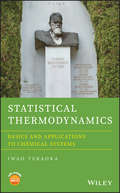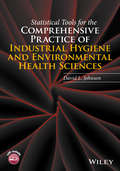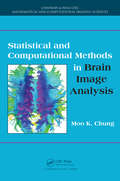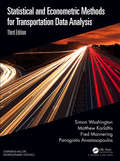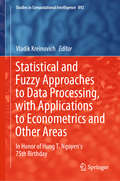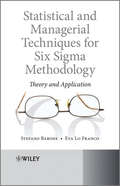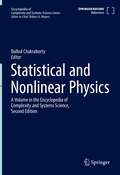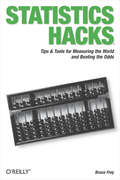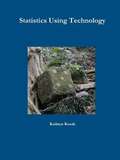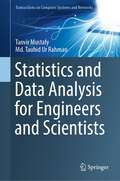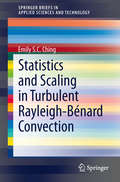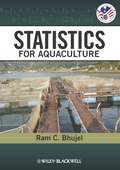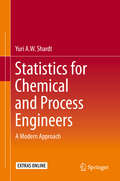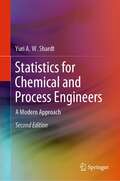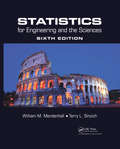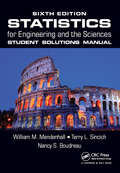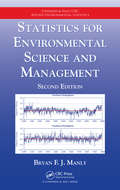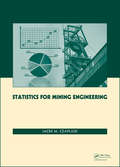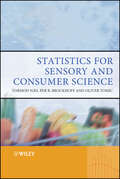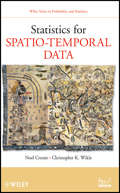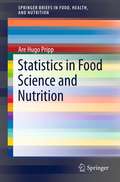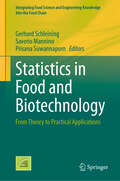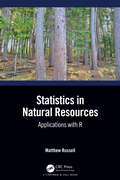- Table View
- List View
Statistical Thermodynamics: An Engineering Approach
by John W. DailyStatistical Thermodynamics: An Engineering Approach covers in a practical, readily understandable manner the underlying meaning of entropy, temperature and other thermodynamic concepts, the foundations of quantum mechanics, and the physical basis of gas, liquid and solid phase properties. It presents simply the relationship between macroscopic and microscopic thermodynamics. In addition, the molecular basis of transport phenomena and chemical kinetics are explored as are basic concepts in spectroscopy. Modern computational tools for solving thermodynamic problems are explored, and the student is assured that he or she will gain knowledge of practical usefulness. This essential text is suitable for mechanical or aerospace engineering graduate students who have a strong background in engineering thermodynamics, those entering advanced fields such as combustion, high temperature gas dynamics, environmental sciences, or materials processing and those who wish to build a background for understanding advanced experimental diagnostic techniques in these or similar fields.
Statistical Thermodynamics: Basics and Applications to Chemical Systems
by Iwao TeraokaThis textbook introduces chemistry and chemical engineering students to molecular descriptions of thermodynamics, chemical systems, and biomolecules. Equips students with the ability to apply the method to their own systems, as today's research is microscopic and molecular and articles are written in that language Provides ample illustrations and tables to describe rather difficult concepts Makes use of plots (charts) to help students understand the mathematics necessary for the contents Includes practice problems and answers
Statistical Tools for the Comprehensive Practice of Industrial Hygiene and Environmental Health Sciences
by David L. JohnsonReviews and reinforces concepts and techniques typical of a first statistics course with additional techniques useful to the IH/EHS practitioner. Includes both parametric and non-parametric techniques described and illustrated in a worker health and environmental protection practice context Illustrated through numerous examples presented in the context of IH/EHS field practice and research, using the statistical analysis tools available in Excel® wherever possible Emphasizes the application of statistical tools to IH/EHS-type data in order to answer IH/EHS-relevant questions Includes an instructor’s manual that follows in parallel with the textbook, including PowerPoints to help prepare lectures and answers in the text as for the Exercises section of each chapter.
Statistical and Computational Methods in Brain Image Analysis (Chapman & Hall/CRC Mathematical and Computational Imaging Sciences Series)
by Moo K. ChungThe massive amount of nonstandard high-dimensional brain imaging data being generated is often difficult to analyze using current techniques. This challenge in brain image analysis requires new computational approaches and solutions. But none of the research papers or books in the field describe the quantitative techniques with detailed illustratio
Statistical and Econometric Methods for Transportation Data Analysis (Chapman & Hall/CRC Interdisciplinary Statistics)
by Simon Washington Matthew G. Karlaftis Fred Mannering Panagiotis AnastasopoulosPraise for the Second Edition: The second edition introduces an especially broad set of statistical methods … As a lecturer in both transportation and marketing research, I find this book an excellent textbook for advanced undergraduate, Master’s and Ph.D. students, covering topics from simple descriptive statistics to complex Bayesian models. … It is one of the few books that cover an extensive set of statistical methods needed for data analysis in transportation. The book offers a wealth of examples from the transportation field. —The American Statistician Statistical and Econometric Methods for Transportation Data Analysis, Third Edition offers an expansion over the first and second editions in response to the recent methodological advancements in the fields of econometrics and statistics and to provide an increasing range of examples and corresponding data sets. It describes and illustrates some of the statistical and econometric tools commonly used in transportation data analysis. It provides a wide breadth of examples and case studies, covering applications in various aspects of transportation planning, engineering, safety, and economics. Ample analytical rigor is provided in each chapter so that fundamental concepts and principles are clear and numerous references are provided for those seeking additional technical details and applications. New to the Third Edition Updated references and improved examples throughout. New sections on random parameters linear regression and ordered probability models including the hierarchical ordered probit model. A new section on random parameters models with heterogeneity in the means and variances of parameter estimates. Multiple new sections on correlated random parameters and correlated grouped random parameters in probit, logit and hazard-based models. A new section discussing the practical aspects of random parameters model estimation. A new chapter on Latent Class Models. A new chapter on Bivariate and Multivariate Dependent Variable Models. Statistical and Econometric Methods for Transportation Data Analysis, Third Edition can serve as a textbook for advanced undergraduate, Masters, and Ph.D. students in transportation-related disciplines including engineering, economics, urban and regional planning, and sociology. The book also serves as a technical reference for researchers and practitioners wishing to examine and understand a broad range of statistical and econometric tools required to study transportation problems.
Statistical and Fuzzy Approaches to Data Processing, with Applications to Econometrics and Other Areas: In Honor of Hung T. Nguyen's 75th Birthday (Studies in Computational Intelligence #892)
by Vladik KreinovichMainly focusing on processing uncertainty, this book presents state-of-the-art techniques and demonstrates their use in applications to econometrics and other areas. Processing uncertainty is essential, considering that computers – which help us understand real-life processes and make better decisions based on that understanding – get their information from measurements or from expert estimates, neither of which is ever 100% accurate. Measurement uncertainty is usually described using probabilistic techniques, while uncertainty in expert estimates is often described using fuzzy techniques. Therefore, it is important to master both techniques for processing data. This book is highly recommended for researchers and students interested in the latest results and challenges in uncertainty, as well as practitioners who want to learn how to use the corresponding state-of-the-art techniques.
Statistical and Managerial Techniques for Six Sigma Methodology: Theory and Application
by Stefano Barone Eva Lo FrancoSix Sigma methodology is a business management strategy which seeks to improve the quality of process output by identifying and removing the causes of errors and minimizing variability in manufacturing and business processes. This book examines the Six Sigma methodology through illustrating the most widespread tools and techniques involved in Six Sigma application. Both managerial and statistical aspects are analysed allowing the reader to apply these tools in the field. Furthermore, the book offers insight on variation and risk management and focuses on the structure and organizational aspects of Six Sigma projects. Key features: • Presents both statistical and managerial aspects of Six Sigma, covering both basic and more advanced statistical techniques. • Provides clear examples and case studies to illustrate the concepts and methodologies used in Six Sigma. • Written by experienced authors in the field. This textbook is ideal for graduates studying Six Sigma for Black Belt and Green Belt qualifications as well as for engineering and quality management courses. Business consultants and consultancy firms implementing Six Sigma will also benefit from this book.
Statistical and Nonlinear Physics (Encyclopedia of Complexity and Systems Science Series)
by Bulbul ChakrabortyThis volume of the Encyclopedia of Complexity and Systems Science, Second Edition, focuses on current challenges in the field from materials and mechanics to applications of statistical and nonlinear physics in the life sciences. Challenges today are mostly in the realm of non-equilibrium systems, although certain equilibrium systems also present serious hurdles. Where possible, pairwise articles focus on a single topic, one from a theoretical perspective and the other from an experimental one, providing valuable insights. In other cases, theorists and experimentalists have collaborated on a single article. Coverage includes both quantum and classical systems, and emphasizes 1) mature fields that are not covered in the current specialist literature, (2) topics that fall through the cracks in disciplinary journals/books, or (3) developing areas where the knowledge base is large and robust and upon which future developments will depend. The result is an invaluable resource for condensed matter physicists, material scientists, engineers and life scientists.
Statistics Hacks: Tips & Tools for Measuring the World and Beating the Odds
by Bruce FreyWant to calculate the probability that an event will happen? Be able to spot fake data? Prove beyond doubt whether one thing causes another? Or learn to be a better gambler? You can do that and much more with 75 practical and fun hacks packed into Statistics Hacks. These cool tips, tricks, and mind-boggling solutions from the world of statistics, measurement, and research methods will not only amaze and entertain you, but will give you an advantage in several real-world situations-including business.This book is ideal for anyone who likes puzzles, brainteasers, games, gambling, magic tricks, and those who want to apply math and science to everyday circumstances. Several hacks in the first chapter alone-such as the "central limit theorem,", which allows you to know everything by knowing just a little-serve as sound approaches for marketing and other business objectives. Using the tools of inferential statistics, you can understand the way probability works, discover relationships, predict events with uncanny accuracy, and even make a little money with a well-placed wager here and there.Statistics Hacks presents useful techniques from statistics, educational and psychological measurement, and experimental research to help you solve a variety of problems in business, games, and life. You'll learn how to:Play smart when you play Texas Hold 'Em, blackjack, roulette, dice games, or even the lotteryDesign your own winnable bar bets to make money and amaze your friendsPredict the outcomes of baseball games, know when to "go for two" in football, and anticipate the winners of other sporting events with surprising accuracyDemystify amazing coincidences and distinguish the truly random from the only seemingly random--even keep your iPod's "random" shuffle honestSpot fraudulent data, detect plagiarism, and break codesHow to isolate the effects of observation on the thing observedWhether you're a statistics enthusiast who does calculations in your sleep or a civilian who is entertained by clever solutions to interesting problems, Statistics Hacks has tools to give you an edge over the world's slim odds.
Statistics Using Technology
by Kathryn KozakThis is a statistics textbook to be used in an introductory statistics class. This book uses technology to calculate probabilities. The approach to this textbook is to ask people to interpret statistics and think statistically.
Statistics and Data Analysis for Engineers and Scientists (Transactions on Computer Systems and Networks)
by Tanvir Mustafy Md. Tauhid RahmanThis textbook summarizes the different statistical, scientific, and financial data analysis methods for users ranging from a high school level to a professional level. It aims to combine the data analysis methods using three different programs—Microsoft Excel, SPSS, and MATLAB. The book combining the different data analysis tools is a unique approach. The book presents a variety of real-life problems in data analysis and machine learning, delivering the best solution. Analysis methods presented in this book include but are not limited to, performing various algebraic and trigonometric operations, regression modeling, and correlation, as well as plotting graphs and charts to represent the results. Fundamental concepts of applied statistics are also explained here, with illustrative examples. Thus, this book presents a pioneering solution to help a wide range of students, researchers, and professionals learn data processing, interpret different findings derived from the analyses, and apply them to their research or professional fields. The book also includes worked examples of practical problems. The primary focus behind designing these examples is understanding the concepts of data analysis and how it can solve problems. The chapters include practice exercises to assist users in enhancing their skills to execute statistical analysis calculations using software instead of relying on tables for probabilities and percentiles in the present world.
Statistics and Probability Theory
by Michael Havbro FaberThis book provides the reader with the basic skills and tools of statistics and probability in the context of engineering modeling and analysis. The emphasis is on the application and the reasoning behind the application of these skills and tools for the purpose of enhancing decision making in engineering. The purpose of the book is to ensure that the reader will acquire the required theoretical basis and technical skills such as to feel comfortable with the theory of basic statistics and probability. Moreover, in this book, as opposed to many standard books on the same subject, the perspective is to focus on the use of the theory for the purpose of engineering model building and decision making. This work is suitable for readers with little or no prior knowledge on the subject of statistics and probability.
Statistics and Scaling in Turbulent Rayleigh-Bénard Convection
by Emily S.C. ChingThis Brief addresses two issues of interest of turbulent Rayleigh-Bénard convection. The rst issue is the characterization and understanding of the statistics of the velocity and temperature uctuations in the system. The second issue is the revelation and understanding of the nature of the scaling behavior of the velocity temperature structure functions. The problem under the Oberbeck-Boussinesq approximation is formulated. The statistical tools, including probability density functions (PDF) and conditional statistics, for studying fluctuations are introduced, and implicit PDF formulae for fluctuations obeying certain statistical symmetries are derived. Applications of these PDF formulae to study the fluctuations in turbulent Rayleigh-Bénard convection are then discussed. The phenomenology of the different types of scaling behavior: the Bolgiano-Obhukov scaling behavior when buoyancy effects are significant and the Kolmogorov-Obukhov-Corrsin scaling behavior when they are not, is introduced. A crossover between the two types of scaling behavior is expected to occur at the Bolgiano length scale above which buoyancy is important. The experimental observations are reviewed. In the central region of the convective cell, the Kolmogorov-Obukhov-Corrsin scaling behavior has been observed. On the other hand, the Bolgiano-Obukhov scaling remains elusive only until recently. By studying the dependence of the conditional temperature structure functions on the locally averaged thermal dissipation rate, evidence for the Bolgiano-Obukhov scaling has recently been found near the bottom plate. The different behaviors observed in the two regions could be attributed to the different size of the Bolgiano scale. What physics determines the relative size of the Bolgiano scale remains to be understood. The Brief is concluded by a discussion of these outstanding issues.
Statistics for Aquaculture (United States Aquaculture Society series)
by Ram C. BhujelPublished in cooperation with the United States Aquaculture Society A strong background in statistics is essential for researchers in any scientific field in order to design experiments, survey research, analyze data, and present findings accurately. To date, there has been no single text to address these concepts in the context of aquaculture research. Statistics for Aquaculture fills that gap by providing user-friendly coverage of statistical principles and methods geared specifically toward the aquaculture community. Statistics for Aquaculture begins with an introduction to basic concepts such as experimental units and data collection, transitions through the fundamentals of experimental design and hypothesis formulation, and culminates with a discussion of experimental analysis and advanced topics in the latest research. Well-illustrated with examples from around the world, each chapter ends with practical exercises to better apply the information covered. Statistics for Aquaculture is a must-have title for students, researchers, professors, and industry personnel alike. Applicable as an introduction to aquaculture or a valuable refresher, this textbook is the first of its kind in this field.
Statistics for Chemical and Process Engineers
by Yuri A. W. ShardtA coherent, concise and comprehensive course in the statistics needed for a modern career in chemical engineering; covers all of the concepts required for the American Fundamentals of Engineering examination. This book shows the reader how to develop and test models, design experiments and analyse data in ways easily applicable through readily available software tools like MS Excel® and MATLAB®. Generalized methods that can be applied irrespective of the tool at hand are a key feature of the text. The reader is given a detailed framework for statistical procedures covering: · data visualization; · probability; · linear and nonlinear regression; · experimental design (including factorial and fractional factorial designs); and · dynamic process identification. Main concepts are illustrated with chemical- and process-engineering-relevant examples that can also serve as the bases for checking any subsequent real implementations. Questions are provided (with solutions available for instructors) to confirm the correct use of numerical techniques, and templates for use in MS Excel and MATLAB can also be downloaded from extras. springer. com. With its integrative approach to system identification, regression and statistical theory, Statistics for Chemical and Process Engineers provides an excellent means of revision and self-study for chemical and process engineers working in experimental analysis and design in petrochemicals, ceramics, oil and gas, automotive and similar industries and invaluable instruction to advanced undergraduate and graduate students looking to begin a career in the process industries.
Statistics for Chemical and Process Engineers: A Modern Approach
by Yuri A.W. ShardtA coherent, concise, and comprehensive course in the statistics needed for a modern career in chemical engineering covers all of the concepts required for the American Fundamentals of Engineering Examination.Statistics for Chemical and Process Engineers (second edition) shows the reader how to develop and test models, design experiments and analyze data in ways easily applicable through readily available software tools like MS Excel® and MATLAB® and is updated for the most recent versions of both. Generalized methods that can be applied irrespective of the tool at hand are a key feature of the text, and it now contains an introduction to the use of state-space methods.The reader is given a detailed framework for statistical procedures covering: data visualization;probability;linear and nonlinear regression; experimental design (including factorial and fractional factorial designs); and dynamic process identification. Main concepts are illustrated with chemical- and process-engineering-relevant examples that can also serve as the bases for checking any subsequent real implementations. Questions are provided (with solutions available for instructors) to confirm the correct use of numerical techniques, and templates for use in MS Excel and MATLAB are also available for download. With its integrative approach to system identification, regression, and statistical theory, this book provides an excellent means of revision and self-study for chemical and process engineers working in experimental analysis and design in petrochemicals, ceramics, oil and gas, automotive and similar industries, and invaluable instruction to advanced undergraduate and graduate students looking to begin a career in the process industries.
Statistics for Engineering and the Sciences
by William M. Mendenhall Terry L. SincichPrepare Your Students for Statistical Work in the Real WorldStatistics for Engineering and the Sciences, Sixth Edition is designed for a two-semester introductory course on statistics for students majoring in engineering or any of the physical sciences. This popular text continues to teach students the basic concepts of data description and statist
Statistics for Engineering and the Sciences Student Solutions Manual
by William M. Mendenhall Nancy S. Boudreau Terry L. SincichA companion to Mendenhall and Sincich’s Statistics for Engineering and the Sciences, Sixth Edition, this student resource offers full solutions to all of the odd-numbered exercises.
Statistics for Environmental Science and Management (Chapman & Hall/CRC Applied Environmental Statistics)
by Bryan F.J. ManlyPresenting a nonmathematical approach to this topic, Statistics for Environmental Science and Management introduces frequently used statistical methods and practical applications for the environmental field. This second edition features updated references and examples along with new and expanded material on data quality objectives, the generalized linear model, spatial data analysis, and Monte Carlo risk assessment. Additional topics covered include environmental monitoring, impact assessment, censored data, environmental sampling, the role of statistics in environmental science, assessing site reclamation, and drawing conclusions from data.
Statistics for Mining Engineering
by Jacek M. CzaplickiMany areas of mining engineering gather and use statistical information, provided by observing the actual operation of equipment, their systems, the development of mining works, surface subsidence that accompanies underground mining, displacement of rocks surrounding surface pits and underground drives and longwalls, amongst others. In addition, th
Statistics for Sensory and Consumer Science
by Per Brockhoff Oliver Tomic Tormod NæsAs we move further into the 21st Century, sensory and consumer studies continue to develop, playing an important role in food science and industry. These studies are crucial for understanding the relation between food properties on one side and human liking and buying behaviour on the other.This book by a group of established scientists gives a comprehensive, up-to-date overview of the most common statistical methods for handling data from both trained sensory panels and consumer studies of food.It presents the topic in two distinct sections: problem-orientated (Part I) and method orientated (Part II), making it to appropriate for people at different levels with respect to their statistical skills.This book succesfully:Makes a clear distinction between studies using a trained sensory panel and studies using consumers.Concentrates on experimental studies with focus on how sensory assessors or consumers perceive and assess various product properties.Focuses on relationships between methods and techniques and on considering all of them as special cases of more general statistical methodologiesIt is assumed that the reader has a basic knowledge of statistics and the most important data collection methods within sensory and consumer science.This text is aimed at food scientists and food engineers working in research and industry, as well as food science students at master and PhD level. In addition, applied statisticians with special interest in food science will also find relevant information within the book.
Statistics for Spatio-Temporal Data
by Noel Cressie Christopher K. WikleWinner of the 2013 DeGroot Prize. A state-of-the-art presentation of spatio-temporal processes, bridging classic ideas with modern hierarchical statistical modeling concepts and the latest computational methods Noel Cressie and Christopher K. Wikle, are also winners of the 2011 PROSE Award in the Mathematics category, for the book "Statistics for Spatio-Temporal Data" (2011), published by John Wiley and Sons. (The PROSE awards, for Professional and Scholarly Excellence, are given by the Association of American Publishers, the national trade association of the US book publishing industry. ) Statistics for Spatio-Temporal Data has now been reprinted with small corrections to the text and the bibliography. The overall content and pagination of the new printing remains the same; the difference comes in the form of corrections to typographical errors, editing of incomplete and missing references, and some updated spatio-temporal interpretations. From understanding environmental processes and climate trends to developing new technologies for mapping public-health data and the spread of invasive-species, there is a high demand for statistical analyses of data that take spatial, temporal, and spatio-temporal information into account. Statistics for Spatio-Temporal Data presents a systematic approach to key quantitative techniques that incorporate the latest advances in statistical computing as well as hierarchical, particularly Bayesian, statistical modeling, with an emphasis on dynamical spatio-temporal models. Cressie and Wikle supply a unique presentation that incorporates ideas from the areas of time series and spatial statistics as well as stochastic processes. Beginning with separate treatments of temporal data and spatial data, the book combines these concepts to discuss spatio-temporal statistical methods for understanding complex processes. Topics of coverage include: Exploratory methods for spatio-temporal data, including visualization, spectral analysis, empirical orthogonal function analysis, and LISAs Spatio-temporal covariance functions, spatio-temporal kriging, and time series of spatial processes Development of hierarchical dynamical spatio-temporal models (DSTMs), with discussion of linear and nonlinear DSTMs and computational algorithms for their implementation Quantifying and exploring spatio-temporal variability in scientific applications, including case studies based on real-world environmental data Throughout the book, interesting applications demonstrate the relevance of the presented concepts. Vivid, full-color graphics emphasize the visual nature of the topic, and a related FTP site contains supplementary material. Statistics for Spatio-Temporal Data is an excellent book for a graduate-level course on spatio-temporal statistics. It is also a valuable reference for researchers and practitioners in the fields of applied mathematics, engineering, and the environmental and health sciences.
Statistics in Food Science and Nutrition
by Are Hugo PrippMany statistical innovations are linked to applications in food science. For example, the student t-test (a statistical method) was developed to monitor the quality of stout at the Guinness Brewery and multivariate statistical methods are applied widely in the spectroscopic analysis of foods. Nevertheless, statistical methods are most often associated with engineering, mathematics, and the medical sciences, and are rarely thought to be driven by food science. Consequently, there is a dearth of statistical methods aimed specifically at food science, forcing researchers to utilize methods intended for other disciplines. The objective of this Brief will be to highlight the most needed and relevant statistical methods in food science and thus eliminate the need to learn about these methods from other fields. All methods and their applications will be illustrated with examples from research literature.
Statistics in Food and Biotechnology: From Theory to Practical Applications (Integrating Food Science and Engineering Knowledge Into the Food Chain #16)
by Saverio Mannino Gerhard Schleining Prisana SuwannapornThe proper use of statistical methods is essential in food processing and biotechnology, and very few publications have focused on the practical application of these methods. This book utilizes case studies to explain the corresponding basics with a focus on understanding how and when to use the appropriate statistical methods. The text is structured according to practical applications, starting from data collection and data treatment, moving to product development, process control and analytical methods. Practical Examples of Using Statistics in Food and Biotechnology begins with a detailed introduction to statistics and their use in food processing. The first main section focuses on statistics for data collection and treatment featuring scales of measurement, sampling and summarizing and presenting data. Another section looks at statistics for food product and process development, examining mixture experiments for different food groups from meat and fish to vegetables, juices, rice and olive oils. Further sections focus on statistical process control, statistics for sensory science and a wide range of analytical methods including LC-MS/MS and other cutting edge methods. In providing practical, hands-on information on the use of statistics in food processing, this work will be of major importance for food professionals, industry staff and researchers in food and biotechnology. .
Statistics in Natural Resources: Applications with R
by Matthew RussellTo manage our environment sustainably, professionals must understand the quality and quantity of our natural resources. Statistical analysis provides information that supports management decisions and is universally used across scientific disciplines. Statistics in Natural Resources: Applications with R focuses on the application of statistical analyses in the environmental, agricultural, and natural resources disciplines. This is a book well suited for current or aspiring natural resource professionals who are required to analyze data and perform statistical analyses in their daily work. More seasoned professionals who have previously had a course or two in statistics will also find the content familiar. This text can also serve as a bridge between professionals who understand statistics and want to learn how to perform analyses on natural resources data in R. The primary goal of this book is to learn and apply common statistical methods used in natural resources by using the R programming language. If you dedicate considerable time to this book, you will: Develop analytical and visualization skills for investigating the behavior of agricultural and natural resources data. Become competent in importing, analyzing, and visualizing complex data sets in the R environment. Recode, combine, and restructure data sets for statistical analysis and visualization. Appreciate probability concepts as they apply to environmental problems. Understand common distributions used in statistical applications and inference. Summarize data effectively and efficiently for reporting purposes. Learn the tasks required to perform a variety of statistical hypothesis tests and interpret their results. Understand which modeling frameworks are appropriate for your data and how to interpret predictions. Includes over 130 exercises in R, with solutions available on the book’s website.

